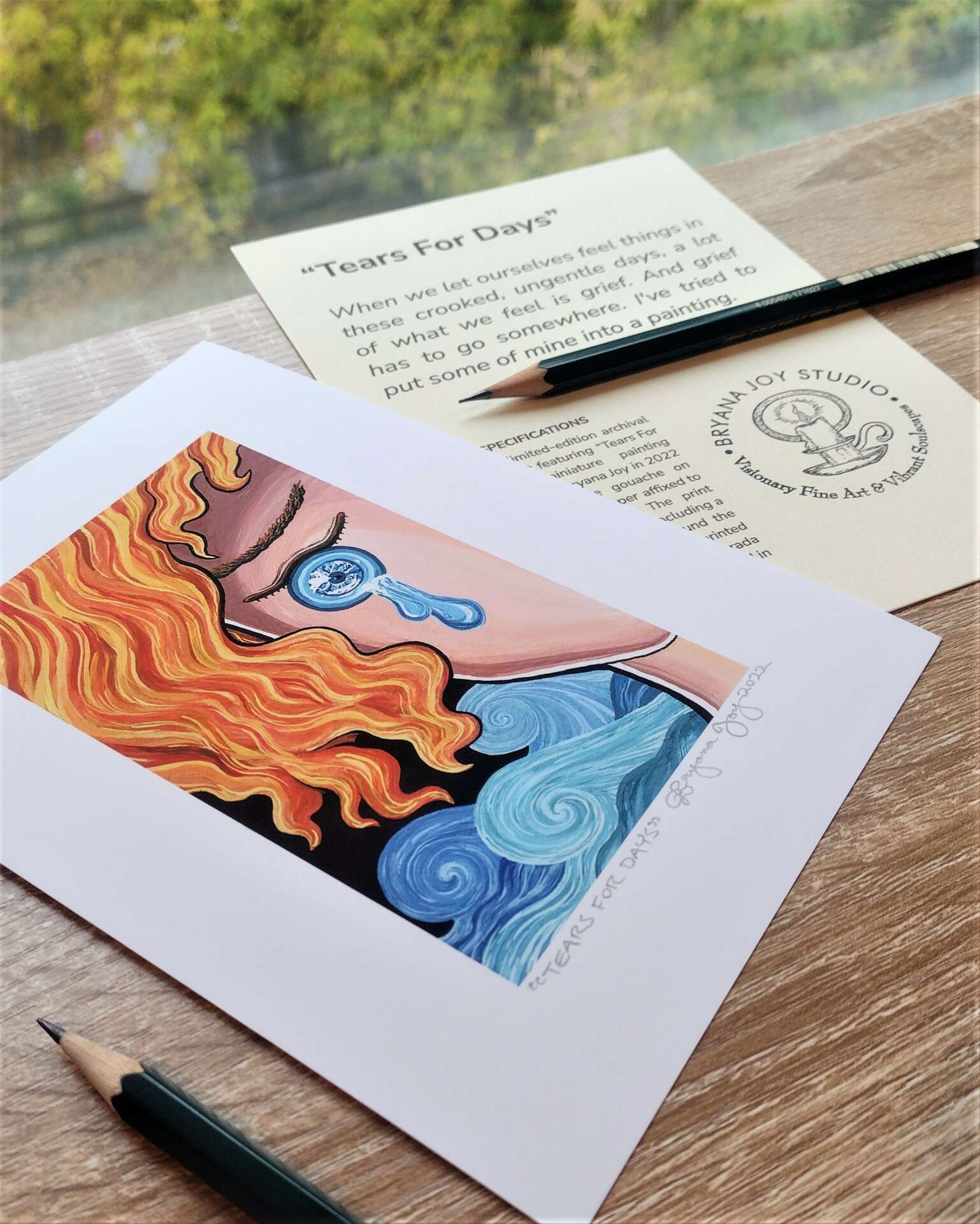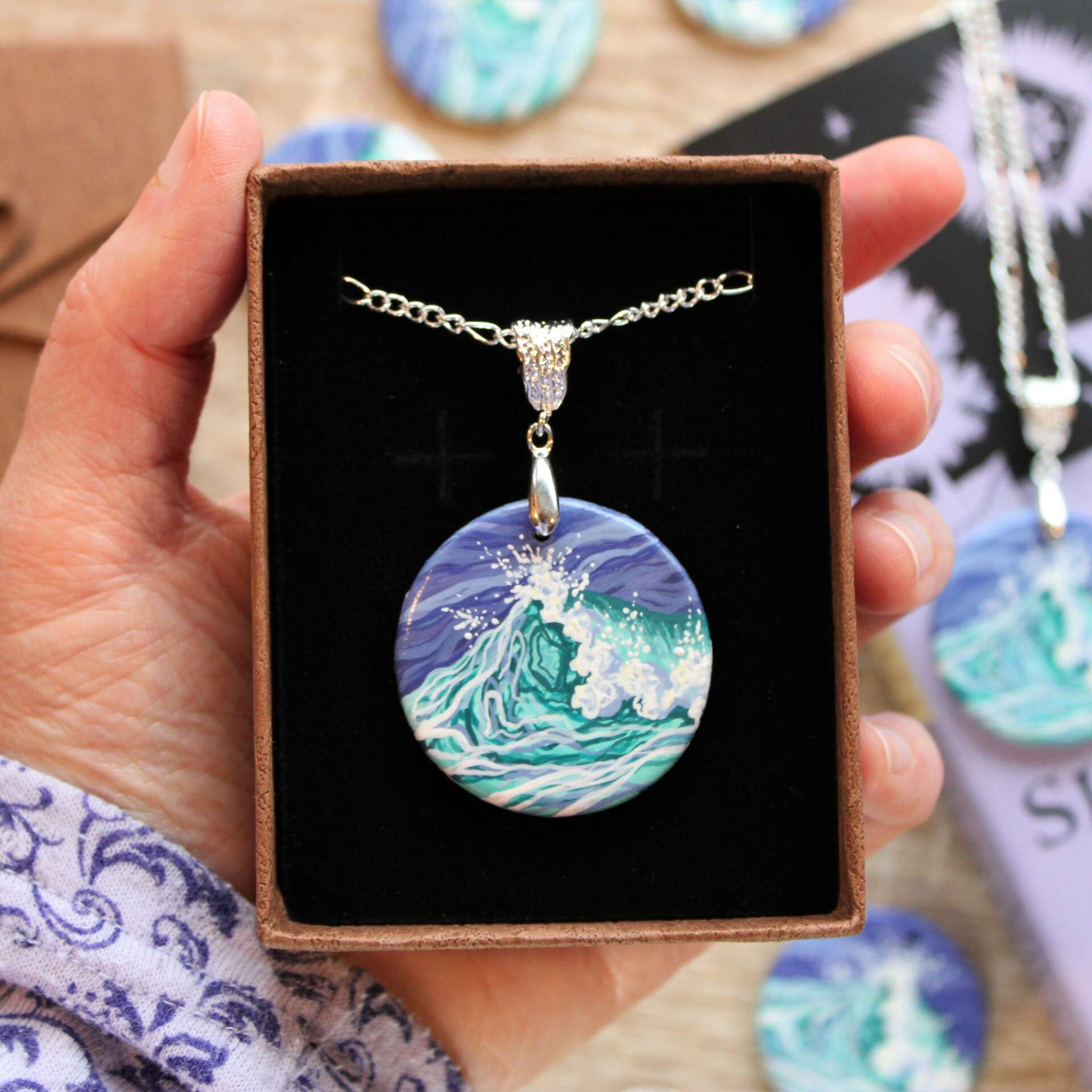Alright – so today we’ve got the honor of introducing you to Bryana Joy. We think you’ll enjoy our conversation, we’ve shared it below.
Hi Bryana, thanks for joining us today. Can you talk to us about a project that’s meant a lot to you?
Four and a half years have passed since I quit my job to become a full-time artist selling my work primarily via online and social media channels, and if I could summarize in three words my primary takeaway from that experience, it would be these: people aren’t brands.
To me one of the saddest consequences of the stranglehold corporatism has on the American consciousness is the ever-bigger push to condense the beautiful intricacy of our humanity into bite-sized morsels of brand recognition. If you’ve ever tried to grow your online presence, you know just what I mean. “Pick a niche!” we’re told. “Know your audience!” “What is the one thing you want to be known for?” In a hundred little phrases, we’re reminded that the path to large-scale success involves becoming smaller, simpler, & more consumer-ready than any of us actually are. In short, becoming a brand.
As a full-time painter and poetry workshop teacher who needs to make a certain amount of money off my work in order to be able to go on doing it, I’ve often felt acutely that lure of viral content creation. How easy it is to crave a giant audience and so choose to structure our online presence around mass appeal and even clickbaiting tactics. I’ve read loads of advice urging artists to do just that, and attended online growth seminars that insisted it was the only way. But in our chaotic social media landscape where one-note brand behavior is rewarded, & complex human behavior is not, one unexpected thing my own experience has taught me is that it’s okay to stay small. In fact, it’s even possible to support yourself as a small artist with a small following. Because small is its own kind of inimitable beautiful.
In my paintings, poetry, and writing, I make it a point to share the many complicated facets that make me human—even though some of those facets are bound to result in a loss of followers. I shy away from engagement-farming tactics or cute questions designed to prompt meaningless comment replies to feed the algorithms. I do my best to avoid squishing myself into a single-sentence “brand,” and yes, this does drive some people away. But here’s the thing I’ve found: the small group of people who stick around to follow the authentic me is the group I really want. Their support is given wholeheartedly, and our connections become something more than transactional. More than that, I’ve found that a tremendous joy comes from making what I really want to make rather than pouring my limited energy into “something that will sell.” And when I’m creating work I believe in—no matter how niche—my genuine unfeigned enthusiasm for my creations makes me a better artist, a better writer, and a better salesperson.


Bryana, love having you share your insights with us. Before we ask you more questions, maybe you can take a moment to introduce yourself to our readers who might have missed our earlier conversations?
I’m a painter, poet, and third-culture kid who has inhabited seventeen different houses on three continents. I grew up in Turkey, living there until the age of fifteen, and I knew I wanted to be an artist from almost the earliest point I can remember. As a child, I spent many happy hours drawing horses and flowers and placid nuclear families on sheets and sheets of copy paper. In highschool, I invented my own handwriting font and filled a stack of homemade journals with watercolor sketches and lettering practice. In college, I launched a little Etsy shop where I infrequently sold hand-painted bookmarks with calligraphy quotes from my favorite authors. And from 2018-2022, I sent out around 7,000 illustrated snail mail letters to 30+ countries as part of a project called the Letters From The Sea Tower.
I grew up in a home where thousands of books lined the walls. My childhood was filled with imaginative adventures inspired by rich literature and powerful stories, and although I have since developed a passion for modern and contemporary poetry, I still derive a lot of joy from studying the classics and sharing their ongoing relevance in fresh ways. My favorite authors include George Eliot, W.S. Merwin, George MacDonald, Anne Brontë, James Baldwin, Aimee Nezhukumatathil, Edna St. Vincent Millay, Aracelis Girmay, Naomi Shihab Nye, e.e. cummings, Gerard Manley Hopkins, and the Brownings. In their own ways, each of these authors have given me Puzzle Pieces—small fragments of a beautiful whole that catches the light now and then and makes me catch my breath. I hold a B.A. in English literature from Hardin-Simmons University and have been writing and publishing since high school. My poetry has appeared or is forthcoming in over three dozen literary magazines, including Poetry Northwest and Beloit Poetry Journal.
At present I spend most of my time creating vivid and somewhat fantastical gouache seascapes, stylized story paintings depicting the loneliness & interconnnectedness of humans in our fragile world, and handpainted literary seascape pendants inspired by oceans from beloved stories and poems. I also host online poetry workshops to foster meaningful arts community & support writers, and I’ve been coping with the implosion of Twitter by creating a spaces for serious conversations about poetry over on Discord.
In my spare time, I enjoy volunteering at my local Boys & Girls Club, exploring the Atlantic coast, and zealously avoiding driving. I listen to Enya with gusto, and if that makes me basic, I don’t even mind.


Is there a particular goal or mission driving your creative journey?
Yes! I think I can summarize the intended direction and slant of my art in only one word and that word is Imagination. You see, I’m a passionate believer in the saving power of Imagination, and by that I don’t just mean that I think it’s a fun thing or that it can enrich our lives. In his novel Hannah Coulter, Wendell Berry writes: “Want of imagination makes things unreal enough to be destroyed. By imagination I mean knowledge and love. I mean compassion.” And that’s the kind of Imagination I believe in: that skillset that enables us to step into the minds and the lives and the pain of other people and come away with some sense of the complex humanity of even the people we dislike the most.
My life has consisted of a great many short sojourns in different kinds of communities around the world, and I feel that Imagination is the almost-unbelievably beautiful gift that came to me out of all that time spent in airports and all those awful goodbyes. I haven’t had the opportunity to belong to a “hometown” and I haven’t had that quiet joy of settled stability in the company of my own people as decades roll by us, but I think I have learned something about the invisible ties of alikeness that unite us each to each across this whole planet. And especially in this era of widespread polarization and political demonization, I think we desperately need artists and poets and storytellers to help us cultivate the power of Imagination with their beautiful, terrible art.


What can society do to ensure an environment that’s helpful to artists and creatives?
I can think of a long list of possible answers to this question, but here’s my simplest one: pay artists for their work. I think most people who don’t do creative work for a living have no idea how much time (and money) goes into the creative process, and I’ve many times throughout my career as an artist run into this expectation that an artist do a massive amount of work for free or for less than minimum wage because “it shouldn’t be about the money.” On several occasions, a new acquaintance who hears I’m a full-time artist has immediately begun telling me about how easy it would be for me to get a “real job.” (I was recently told I should try being an elementary school teacher because “didn’t I want to work?”)
While I think it’s certainly true that creativity is in our DNA and that a good deal of art will always be produced in human leisure time whether it’s funded or not, societies that don’t respect highly-skilled creative work as a legitimate profession end up bleakly utilitarian in their layout and inhospitable for their citizens’ mental health. I believe art, beauty, and imagination are fundamental human needs, and that supporting this work is crucial for a thriving society.
While I see public funding for arts programs—especially within the public school system—as essential, I also think individual people can do a lot to develop and nurture a creative ecosystem simply by choosing to spend less money on corporate products and more money supporting their favorite local and online creators. Based on my own experiences purchasing work from the artists I love and often choosing to forego cheap products in favor of a simpler, sparser, but more lovingly-crafted environment, this decision isn’t much of a sacrifice: purchasing from artisans and small business owners gives me a sense of connection to the items in my world, and it’s good for my soul.


Contact Info:
- Website: www.bryanajoy.com
- Instagram: https://www.instagram.com/_bryana_joy/
- Facebook: https://www.facebook.com/bryanajoystudio
- Twitter: https://twitter.com/_Bryana_Joy


